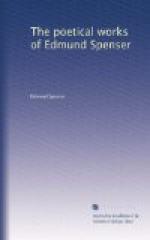How fowlie they their offices abusd,
And them of crimes and heresies accusd;
That pursivants he often for them sent. 565
But they neglected his commaundement;
So long persisted obstinate and bolde,
Till at the length he published to holde
A visitation, and them cyted thether.
Then was high time their wits about to geather; 570
What did they then, but made a composition
With their next neighbor priest for light condition,
To whom their living they resigned quight
For a few pence, and ran away by night.
So passing through the countrey in disguize, 575
They fled farre off, where none might them surprize,
And after that long straied here and there,
Through everie field and forrest farre and nere;
Yet never found occasion for their tourne,
But, almost sterv’d, did much lament and mourne. 580
At last they chaunst to meete upon the way
The Mule, all deckt in goodly rich aray,
With bells and bosses that full lowdly rung,
And costly trappings that to ground downe hung.
Lowly they him saluted in meeke wise; 585
But he through pride and fatnes gan despise
Their meanesse; scarce vouchsafte them to requite.
Whereat the Foxe deep groning in his sprite,
Said: “Ah! Sir Mule, now blessed be the day
That I see you so goodly and so gay 590
In your attyres, and eke your silken hyde
Fil’d with round flesh, that everie bone doth hide.
Seemes that in fruitfull pastures ye doo live,
Or fortune doth you secret favour give.”
“Foolish Foxe!” said the Mule, “thy wretched need
Praiseth the thing that doth thy sorrow breed. 596
For well I weene thou canst not but envie
My wealth, compar’d to thine owne miserie,
That art so leane and meagre waxen late
That scarse thy legs uphold thy feeble gate.” 600
“Ay me!” said then the Foxe, “whom evill hap
Unworthy in such wretchednes doth wrap,
And makes the scorne of other beasts to bee.
But read, faire Sir, of grace, from whence come yee;
Or what of tidings you abroad doo heare; 605
Newes may perhaps some good unweeting beare.”
“From royall court I lately came,” said he,
“Where all the braverie that eye may see,
And all the happinesse that heart desire,
Is to be found; he nothing can admire, 610
That hath not seene that heavens portracture.
But tidings there is none, I you assure,
Save that which common is, and knowne to all,
That courtiers as the tide doo rise and fall.”
“But tell us,” said the Ape, “we doo you pray, 615
Who now in court doth beare the greatest sway:
That, if such fortune doo to us befall,
We may seeke favour of the best of all.”
And them of crimes and heresies accusd;
That pursivants he often for them sent. 565
But they neglected his commaundement;
So long persisted obstinate and bolde,
Till at the length he published to holde
A visitation, and them cyted thether.
Then was high time their wits about to geather; 570
What did they then, but made a composition
With their next neighbor priest for light condition,
To whom their living they resigned quight
For a few pence, and ran away by night.
So passing through the countrey in disguize, 575
They fled farre off, where none might them surprize,
And after that long straied here and there,
Through everie field and forrest farre and nere;
Yet never found occasion for their tourne,
But, almost sterv’d, did much lament and mourne. 580
At last they chaunst to meete upon the way
The Mule, all deckt in goodly rich aray,
With bells and bosses that full lowdly rung,
And costly trappings that to ground downe hung.
Lowly they him saluted in meeke wise; 585
But he through pride and fatnes gan despise
Their meanesse; scarce vouchsafte them to requite.
Whereat the Foxe deep groning in his sprite,
Said: “Ah! Sir Mule, now blessed be the day
That I see you so goodly and so gay 590
In your attyres, and eke your silken hyde
Fil’d with round flesh, that everie bone doth hide.
Seemes that in fruitfull pastures ye doo live,
Or fortune doth you secret favour give.”
“Foolish Foxe!” said the Mule, “thy wretched need
Praiseth the thing that doth thy sorrow breed. 596
For well I weene thou canst not but envie
My wealth, compar’d to thine owne miserie,
That art so leane and meagre waxen late
That scarse thy legs uphold thy feeble gate.” 600
“Ay me!” said then the Foxe, “whom evill hap
Unworthy in such wretchednes doth wrap,
And makes the scorne of other beasts to bee.
But read, faire Sir, of grace, from whence come yee;
Or what of tidings you abroad doo heare; 605
Newes may perhaps some good unweeting beare.”
“From royall court I lately came,” said he,
“Where all the braverie that eye may see,
And all the happinesse that heart desire,
Is to be found; he nothing can admire, 610
That hath not seene that heavens portracture.
But tidings there is none, I you assure,
Save that which common is, and knowne to all,
That courtiers as the tide doo rise and fall.”
“But tell us,” said the Ape, “we doo you pray, 615
Who now in court doth beare the greatest sway:
That, if such fortune doo to us befall,
We may seeke favour of the best of all.”




